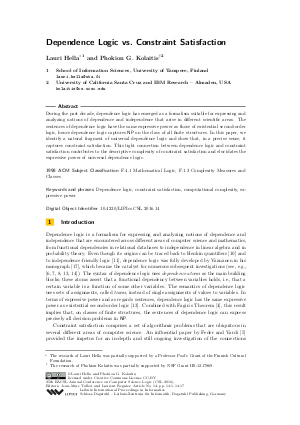Dependence Logic vs. Constraint Satisfaction
Authors Lauri Hella, Phokion G. Kolaitis
-
Part of:
Volume:
25th EACSL Annual Conference on Computer Science Logic (CSL 2016)
Part of: Series: Leibniz International Proceedings in Informatics (LIPIcs)
Part of: Conference: Computer Science Logic (CSL) - License:
 Creative Commons Attribution 3.0 Unported license
Creative Commons Attribution 3.0 Unported license
- Publication Date: 2016-08-29
File

PDF
LIPIcs.CSL.2016.14.pdf
- Filesize: 0.55 MB
- 17 pages
Document Identifiers
Subject Classification
Keywords
- Dependence logic
- constraint satisfaction
- computational complexity
- expressive power
Metrics
- Access Statistics
-
Total Accesses (updated on a weekly basis)
0Document
0Metadata
Abstract
During the past decade, dependence logic has emerged as a formalism suitable for expressing and analyzing notions of dependence and independence that arise in different scientific areas. The sentences of dependence logic have the same expressive power as those of existential second-order logic, hence dependence logic captures NP on the class of all finite structures. In this paper, we identify a natural fragment of universal dependence logic and show that, in a precise sense, it captures constraint satisfaction. This tight connection between dependence logic and constraint satisfaction contributes to the descriptive complexity of constraint satisfaction and elucidates the expressive power of universal dependence logic.
Cite As Get BibTex
Lauri Hella and Phokion G. Kolaitis. Dependence Logic vs. Constraint Satisfaction. In 25th EACSL Annual Conference on Computer Science Logic (CSL 2016). Leibniz International Proceedings in Informatics (LIPIcs), Volume 62, pp. 14:1-14:17, Schloss Dagstuhl – Leibniz-Zentrum für Informatik (2016)
https://doi.org/10.4230/LIPIcs.CSL.2016.14
BibTex
@InProceedings{hella_et_al:LIPIcs.CSL.2016.14,
author = {Hella, Lauri and Kolaitis, Phokion G.},
title = {{Dependence Logic vs. Constraint Satisfaction}},
booktitle = {25th EACSL Annual Conference on Computer Science Logic (CSL 2016)},
pages = {14:1--14:17},
series = {Leibniz International Proceedings in Informatics (LIPIcs)},
ISBN = {978-3-95977-022-4},
ISSN = {1868-8969},
year = {2016},
volume = {62},
editor = {Talbot, Jean-Marc and Regnier, Laurent},
publisher = {Schloss Dagstuhl -- Leibniz-Zentrum f{\"u}r Informatik},
address = {Dagstuhl, Germany},
URL = {https://drops.dagstuhl.de/entities/document/10.4230/LIPIcs.CSL.2016.14},
URN = {urn:nbn:de:0030-drops-65548},
doi = {10.4230/LIPIcs.CSL.2016.14},
annote = {Keywords: Dependence logic, constraint satisfaction, computational complexity, expressive power}
}
Author Details
References
-
Nadia Creignou, Phokion G. Kolaitis, and Heribert Vollmer, editors. Complexity of Constraints - An Overview of Current Research Themes [Result of a Dagstuhl Seminar], volume 5250 of Lecture Notes in Computer Science. Springer, 2008.

-
Arnaud Durand, Juha Kontinen, Nicolas de Rugy-Altherre, and Jouko Väänänen. Tractability frontier of data complexity in team semantics. In Proceedings Sixth International Symposium on Games, Automata, Logics and Formal Verification, GandALF 2015, Genoa, Italy, 21-22nd September 2015., pages 73-85, 2015.

-
Paul Erdös. Graph theory and probability. Canadian J. of Mathematics, 11:34-38, 1959.

-
Ronald Fagin. Generalized first-order spectra and polynomial-time recognizable sets. In Richard Karp, editor, Complexity of Computation, number 7 in SIAM-AMS Proceedings, pages 43-73. SIAM-AMS, 1974.

-
Tomás Feder and Moshe Y. Vardi. The computational structure of monotone monadic SNP and constraint satisfaction: A study through datalog and group theory. SIAM J. Comput., 28(1):57-104, 1998.

-
P. Galliani. Inclusion and exclusion dependencies in team semantics - on some logics of imperfect information. Ann. Pure Appl. Logic, 163(1):68-84, 2012.

- Pietro Galliani and Lauri Hella. Inclusion logic and fixed point logic. In Computer Science Logic 2013 (CSL 2013), CSL 2013, September 2-5, 2013, Torino, Italy, number 23 in LIPIcs, pages 281-295. Schloss Dagstuhl - Leibniz-Zentrum fuer Informatik, 2013. URL: http://dx.doi.org/10.4230/LIPIcs.CSL.2013.281.
- Erich Grädel and Jouko A. Väänänen. Dependence and independence. Studia Logica, 101(2):399-410, 2013. URL: http://dx.doi.org/10.1007/s11225-013-9479-2.
-
Johan Håstad, Andrei A. Krokhin, and Dániel Marx. The constraint satisfaction problem: Complexity and approximability (Dagstuhl Seminar 12451). Dagstuhl Reports, 2(11):1-19, 2012.

-
Leon Henkin. Some remarks on infinitely long formulas. In Infinitistic Methods. Pergamon Press, 1961.

-
Jaakko Hintikka and Gabriel Sandu. Informational independence as a semantical phenomenon. In J. E. Fenstad et al., editor, Logic, Methodology and the Philosophy of Science VIII, pages 571-89. North-Holland, 1989.

- Jarmo Kontinen. Coherence and computational complexity of quantifier-free dependence logic formulas. Studia Logica, 101(2):267-291, 2013. URL: http://dx.doi.org/10.1007/s11225-013-9481-8.
- Juha Kontinen and Jouko A. Väänänen. On definability in dependence logic. Journal of Logic, Language and Information, 18(3):317-332, 2009. URL: http://dx.doi.org/10.1007/s10849-009-9082-0.
- Juha Kontinen and Jouko A. Väänänen. Axiomatizing first-order consequences in dependence logic. Ann. Pure Appl. Logic, 164(11):1101-1117, 2013. URL: http://dx.doi.org/10.1016/j.apal.2013.05.006.
-
Gábor Kun and Jaroslav Nesetril. Forbidden lifts (NP and CSP for combinatorialists). Eur. J. Comb., 29(4):930-945, 2008.

-
Richard E. Ladner. On the structure of polynomial time reducibility. J. ACM, 22(1):155-171, 1975.

- Jouko A. Väänänen. Dependence Logic - A New Approach to Independence Friendly Logic, volume 70 of London Mathematical Society student texts. Cambridge University Press, 2007. URL: http://www.cambridge.org/de/knowledge/isbn/item1164246/.
